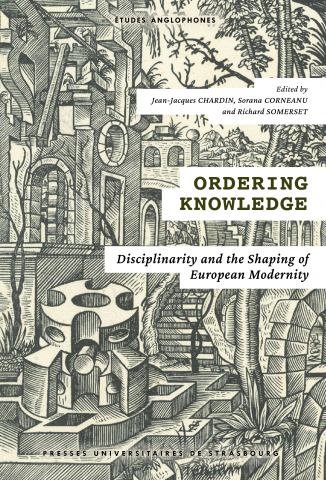Ordering Knowledge: Disciplinarity and the Shaping of European Modernity.
Jean-Jacques Chardin, Sorana Corneanu et Richard Somerset (dir.)
As the world struggles to come to grips with the rise of new populisms that call into question the legitimacy of technocratic expertise, the historical understanding of the processes by which the characteristically modern modes of meaning-making came into existence has never been so important. Politically-motivated attacks on ‘science’ are difficult to counter in a climate of generalised scepticism for all forms of authority, but cultural historians have an important part to play by offering an adequate historical framing for the terms of the debate. The origins of modernity are routinely associated with the empirical attitudes of the ‘scientific revolution’ and the liberal rationalism of the Enlightenment; but this story tends to be studied either conceptually by historians of science, or politically by cultural historians. For it to make sense as the backdrop to modern debates, the political and epistemological dimensions of the emergence of modernity need to be put more firmly into contact with one another. This book attempts to do so by focusing on the theme of the emergence of disciplinarity in the seventeenth and eighteenth centuries.
Table of contents
Acknowledgements.................................................................................................5
Introduction
Richard SOMERSET...................................................................................................7
I. CONCEIVING DISCIPLINARITY: MODERNISING PROJECTS OF KNOWLEDGE
Bacon’s Literary Quest for Scientific Knowledge in Gesta Grayorum (1594) and New Atlantis (1627)
Mickaël POPELARD................................................................................................41
Science, Poetry and Imagination: Disciplinary Negotiations in Eighteenth-Century Scottish Writings on Genius
Sorana CORNEANU...............................................................................................65
‘The Whole Set to View’: Orders of Knowledge in Chambers’ Cyclopaedia
Seth RUDY...............................................................................................................91
Navigating the Labyrinth of Knowledge: ‘Distantiation’ and Narrative Experiments in the Structuring of Encyclopaedic Knowledge
Richard SOMERSET...................................................................................127
‘Things not Words’: the Dissenting Academies and Paradigm Shifts in the Ordering, Definition, and Production of Knowledge, 1662–1783
Matthew SMITH...................................................................................................157
II. SHAPING DISCIPLINARITY: EMERGENT FIELDS OF PRACTICE AND EXPRESSION
The Royal Academy of Sciences of Paris and the Birth of Historical Epistemology
Susana SEGUIN..................................................................................................... 187
Parisian Surgeons of the Seventeenth Century and the Disciplinary Emergence of Modern Medicine
Emilia WILTON-GODBERFFORDE..................................................................... 209
Production and Exchange of Knowledge around 1800: the Example of Anatomical Models in Edinburgh and Philadelphia
Marieke M. A. HENDRIKSEN.............................................................................. 233
The Constitution and Evolution of the First Russian Mineralogical Collection: The Mineral Cabinet of St. Petersburg’s Kunstkamera
Daria NOVGORODOVA......................................................................................253
Instructive Books for Children in Georgian England
Laurence TALAIRACH..........................................................................................277
Bibliography......................................................................................................... 301
Contributors’ biographies................................................................................. 331
Credits....................................................................................................... 337
Ouvrage publié avec le soutien de l’Université de Strasbourg, de l’unité de recherche IDEA, Interdisciplinarité dans les études anglophones (UR 2338) et de l’unité de recherche SEARCH, Savoirs dans l’espace anglophone : représentations, culture, histoire (UR 2325)
